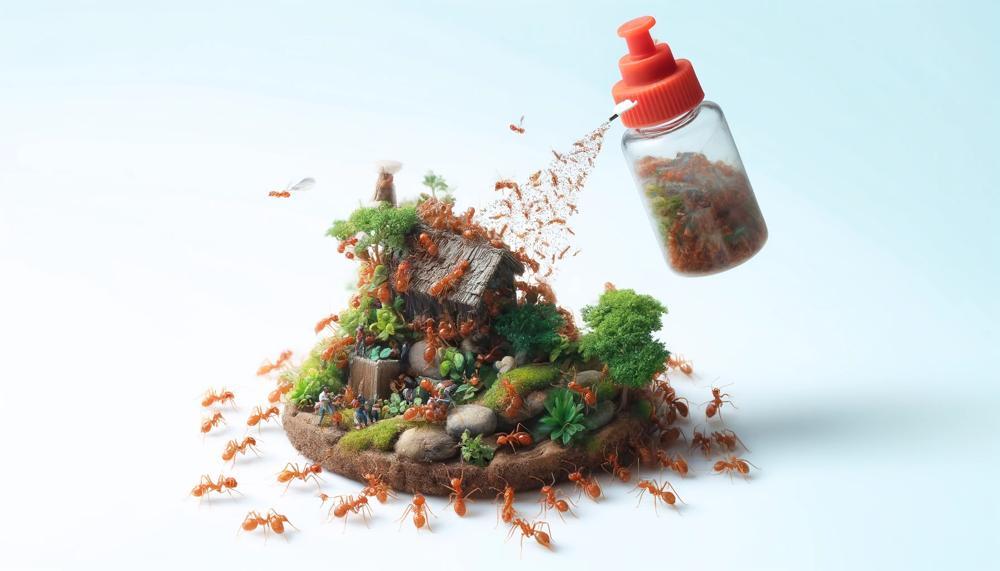Imagine waking up to a silent, meticulous invasion, not from the skies, but from the ground beneath your feet. Army ants, renowned for their organized, relentless marches, can invade homes and gardens, leaving a trail of disruption in their wake.
Unlike their solitary or benign cousins, army ants are nomadic predators, known for their aggressive foraging behavior and sheer numbers, capable of overwhelming and devouring everything in their path. This might sound like a scene from a horror movie, but for many, it’s a startling reality.
In this enlightening piece, we delve into the heart of the issue – not with the intent to declare war, but to harmonize. We’ll explore tried-and-true methods to naturally repel and manage army ant invasions without resorting to harmful chemicals that disrupt our delicate ecosystems.
So, how do you get rid of army ants naturally?
Here are some natural ways to get rid of ants:
- Citrus fruits: Since ants don’t like the smell of citrus foods, you can put orange, lemon, or lime peels around doors and windows.
- Vinegar: In a spray bottle, mix vinegar and water in equal parts to get rid of the paths that ants use to find food.
- Coffee: For ant control, pour hot coffee on anthills.
- Essential oils: You can keep ants out of your house with a few drops of essential oils. Important oils like peppermint and tea tree smell bad to ants. In a spray bottle, mix a few drops of oil with water or dish soap. Then, use it around sinks and drains.
- Cinnamon: Ants don’t like the strong smell of cinnamon, so you can use it to keep them away naturally. Adding essential oil to the cinnamon powder will make it work better.
- Diatomaceous earth: A very fine powder made from the shells of tiny sea creatures. If ants eat the particles, their sharp edges will cut their bodies and kill them.
- Keep your kitchen clean: Since ants are more likely to be active in the spring, keeping your kitchen clean can help keep them away all year.
Let’s embark on this journey together, learning how to coexist peacefully with our six-legged neighbors, one natural solution at a time.
Table of Contents
- 1 Understanding Army Ants: Biology and Behavior
- 2 The Dangers of Chemical Pesticides for You and the Environment
- 3 Boiling Water: A Simple Yet Effective Solution
- 4 Creating Natural Barriers to Keep Army Ants Out
- 5 Harnessing the Power of Vinegar to Repel Army Ants
- 6 Mint: A Natural Repellent for Army Ants
- 7 Using Boric Acid as a Safe and Effective Insecticide
- 8 Encouraging Natural Predators to Control Army Ant Populations
- 9 Conclusion
Understanding Army Ants: Biology and Behavior
Army ants possess a range of distinct characteristics that make them a formidable presence in any environment, particularly challenging to manage and eradicate once they’ve made themselves at home.
Below, we delve into these key traits, offering insights into why these relentless insects are not easily dismissed.
| Characteristic | Description | Impact on Eradication Efforts |
|---|---|---|
| Highly Adaptable | Capable of thriving in diverse ecosystems. | Makes it difficult to use a one-size-fits-all approach to control or eliminate them. |
| Cooperative Behavior | Showcases exceptional unity and cooperation, especially during hunting. | Efficiency in resource acquisition and defense mechanisms complicates interference. |
| Nomadic Lifestyle | Constant movement and lack of permanent nests. | Limits the effectiveness of traditional ant eradication methods like baiting or targeting the nest. |
| Voracious Predators | An opportunistic diet mainly consisting of other insects and small invertebrates. | Their aggressive hunting behavior can disrupt ecosystems but also makes them less susceptible to poison baits designed for scavenging ants. |
| Resilient Queen Structure | The central queen retains wings throughout her life, enabling satellite colony establishment. | Increases the colony’s survival chances by spreading out the population, making total eradication challenging. |
| Powerful Mandibles | Can deliver painful bites when threatened or disturbed. | This defense mechanism can deter predators and make physical removal risky. |
In understanding these characteristics, it becomes evident why army ants are not just another household pest.
Their adaptability, unity, predatory nature, and the unique reproductive strategies of their queens contribute significantly to their resilience against natural eradication methods.
While not impossible to manage, controlling or eliminating army ants demands strategic vigilance and often professional intervention to address effectively.
The Dangers of Chemical Pesticides for You and the Environment
The impact of chemical pesticides on both human health and the environment is undeniably profound and far-reaching.
They’ve become a double-edged sword; while they effectively keep unwanted pests at bay, their toxic legacy can have lasting consequences.
Impact on Human Health:
Chemical pesticides pack a punch with their toxic ingredients, posing numerous health risks ranging from the seemingly benign skin irritation to the more severe, such as cancer and reproductive disorders.
Their ability to wreak havoc on our health is startling—consider the World Health Organization’s estimate that pesticide poisoning claims about 200,000 lives annually, a figure that’s particularly grim in developing countries with lax regulations.
| Health Issue | Associated Pesticides | Potential Outcomes |
| Skin Irritation | Organophosphates, Carbamates | Rashes, Blisters |
| Cancer | Chlorinated hydrocarbons | Leukemia, Lymphoma |
| Reproductive Disorders | Glyphosate | Infertility, Birth Defects |
| Neurological Disorders | Pyrethroids | Memory Loss, Reduced Motor Skills |
Children are particularly susceptible to pesticide exposure. Their developing bodies and close contact with treated areas make them prime targets for the adverse effects, including a higher likelihood of developing certain childhood cancers.
Impact on the Environment:
Pesticides don’t stop at pests; they also pose a threat to the very fabric of our ecosystems. Beneficial insects like bees and butterflies often become collateral damage in the war against pests, leading to declines in biodiversity.
Persistent pesticides contaminate soil and water sources long after their intended use, affecting non-target species and disrupting ecological balance.
Moreover, the battle against pests often turns into a chemical arms race as pests develop resistance, necessitating the use of even more potent toxins.
Boiling Water: A Simple Yet Effective Solution
Using boiling water as a natural strategy to combat army ants taps into a simple yet profoundly effective method, drawing upon the inherent vulnerabilities of these industrious yet invasive creatures. Here’s a closer examination of how boiling water turns the tide against army ants:
Heat Sensitivity: A Critical Weakness
Army ants, despite their formidable organization and aggression, falter in the face of excessive heat. The application of boiling water directly onto their colonies thrusts them into an inhospitable environment – one that exceeds their thermal tolerance.
This sudden spike in temperature can be fatal, leading to immediate disarray within the colony.
Physical Damage: The Toll of Boiling Water
| Aspect | Effect on Army Ants | Outcome |
| Scalding | Direct contact with boiling water burns the ants, damaging their exoskeleton. | Impaired movement and increased vulnerability. |
| Soil Penetration | Hot water seeps into underground nests, reaching ants beyond the surface. | Colony’s core infrastructure is compromised. |
| Residual Heat | Soil retains warmth post-application, deterring return or survival of ants. | Long-term protection against reinfestation. |
Strategic Application: Maximizing Effectiveness
While boiling water is potent against army ants, its indiscriminate use can harm beneficial organisms and plants. A strategic approach involves targeting specific areas known to harbor ant colonies, avoiding direct application to vegetation.
Moreover, employing boiling water as part of a broader pest management strategy enhances its efficacy while minimizing unintended environmental impacts.
Safety Considerations: Handling with Care
The paramount importance of safety when deploying boiling water cannot be overstated. Protective gear and cautious handling ensure that this remedy remains beneficial rather than hazardous to the user.
Understanding and respecting the power of boiling water is key to its successful application against army ant invasions.
Creating Natural Barriers to Keep Army Ants Out
To fend off an invasion of army ants, deploying natural barriers proves not only effective but also environmentally friendly.
| Barrier Type | Description | Application Tips |
|---|---|---|
| Water Moats/Trenches | A physical barrier exploiting the ants’ inability to swim. | Encircle your property with a trench filled with water. Make sure it’s maintained regularly to prevent drying out. |
| Diatomaceous Earth (DE) | A powder that dehydrates ants upon contact. | Spread a thin layer around the property perimeter. Reapply post-rain or in windy conditions for continuous efficacy. |
| Repellent Plants | Plants like peppermint, lavender, and eucalyptus deter ants with their strong scents. | Plant these around your property’s boundary. Additionally, sprinkle crushed leaves near entry points. |
| Citrus Oils/Vinegar | Natural scents that repel army ants. | Create a mixture of water with citrus essential oils or vinegar and spray around the house perimeter. |
| Prevention Practices | Maintaining cleanliness to avoid attracting ants. | Ensure food scraps are properly disposed of and trash cans are sealed. Repair cracks or holes to deny entry. |
Harnessing the Power of Vinegar to Repel Army Ants
How Vinegar Keeps Army Ants at Bay
Vinegar, with its sharp scent and high acidity (pH 2.5-3.5), is a formidable foe for army ants. The essence of how vinegar works lies in its ability to mess with the ants’ communication lines. Army ants rely on pheromone trails for navigation and coordination. When vinegar is introduced, its pungent aroma overpowers these pheromone trails, leading to confusion and disarray among the ants. They lose their way, making it difficult for them to invade your space.
Moreover, vinegar’s acidic nature doesn’t sit well with the ants’ exoskeleton. It has a drying effect, leading to dehydration and, ultimately, their demise. This dual action makes vinegar not just a repellent but also a deterrent against future invasions.

Optimising Vinegar’s Effectiveness Against Army Ants
To turn vinegar into an ant-repelling powerhouse, follow these steps:
| Preparation | Method | Application Frequency |
| Vinegar and Water Solution | Mix equal parts of white vinegar and water in a spray bottle. Shake well. | Spray on ant trails, entry points, and gathering areas every few days or after rain. |
| Vinegar-Soaked Barriers | Soak cotton balls in a vinegar solution. Place them near ant entry points or trails. | Replace cotton balls as they dry out or every week for constant protection. |
Remember, while setting up your vinegar defenses:
- Choose White Vinegar: It’s more acidic than other types, enhancing its repellent properties without leaving residues.
- Avoid Plants: Vinegar can harm plants. Use soaked cotton balls near greenery instead of spraying.
- Persistence Pays: Reapply regularly to maintain a vinegar barrier as its potency diminishes over time.
- Safety First: While vinegar is safe for humans and pets, ensure it doesn’t end up in places where it might be ingested by animals or small children.
Mint: A Natural Repellent for Army Ants
Mint, with its refreshing aroma, packs a punch not just in our mojitos but also as a formidable foe against army ants.
These critters, known for their destructive marches through homes and gardens, meet their match in the simple mint plant. The secret weapon? Menthol—a nifty compound that sends these insects packing.
The Mighty Menthol: How Mint Repels Army Ants
Menthol doesn’t just tingle our senses; it wreaks havoc on army ants’ nervous systems. It’s like setting off an alarm in their tiny insect brains, making mint-laden areas no-go zones.
This natural insecticide quality of menthol makes mint an eco-friendly alternative to chemical repellents.
Minty Methods: Keeping Army Ants at Bay
Deploying mint as an ant deterrent can be both simple and creative. Here are a few strategies:
| Method | Preparation | Application |
| Guardian Plants | Plant mint around your home’s perimeter. | No direct action needed; the plants do the work. |
| Leafy Barricades | Crush fresh mint leaves. | Sprinkle around entry points and ant trails. |
| Spray Away | Mix peppermint oil with water in a spray bottle. | Spray around doors, windows, and ant trails. |
Using Boric Acid as a Safe and Effective Insecticide
Boric acid operates as an insecticide by targeting the digestive and metabolic systems of army ants, effectively turning it into a stomach poison that leads to dehydration and starvation.
This method is not only potent but also ensures the gradual elimination of entire colonies, as affected ants transport the boric acid back to their nests, unwittingly sharing the lethal agent with their kin.
How Boric Acid Works as an Insecticide:
| Mode of Action | Impact on Ants | Outcome |
| Stomach Poison | Disrupts digestive system | Dehydration and death |
| Metabolic Interference | Prevents energy production | Starvation and death |
| Colony Distribution | Transfer of boric acid to other ants | Collapse of colony |
Safety for Household Use:
Boric acid presents a low-risk option for households aiming to combat ant invasions, thanks to its minimal toxicity to humans and pets when used correctly. It’s crucial, however, to apply boric acid with precision and in moderation—specifically in zones frequented by ants. Ensuring it’s kept out of reach from children and pets is non-negotiable.
Its environmentally benign nature further underscores its suitability for both indoor and outdoor applications, aligning with sustainable practices. Notably, the application of boric acid aligns with organic gardening principles, reinforcing its eco-friendly credentials.
Encouraging Natural Predators to Control Army Ant Populations
To tackle the issue of controlling army ant populations, embracing the role of natural predators stands out as a savvy and eco-friendly strategy. These predators, including anteaters, spiders, birds, and various insects, are nature’s own pest control agents. Here’s how homeowners can lure these allies into their gardens:
| Predator | How They Help | Attracting Them |
| Anteaters | Feast on large numbers of ants, significantly reducing populations. | Though not applicable for all locales, maintaining a habitat close to natural bushland can encourage their presence. |
| Spiders | Trap and consume a variety of ants. | Provide sheltering plants and minimize pesticide use to create a spider-friendly environment. |
| Birds | Eat ants directly from the ground or trees, helping in population control. | Install bird feeders and birdbaths; plant native trees that offer both food and nesting opportunities. |
| Insects (e.g., Beetles, Flies) | Prey on ants, disrupting their foraging and nest-building. | Plant a variety of flowers to attract them; use organic gardening practices to ensure their survival. |
Creating a diverse ecosystem is the cornerstone of this strategy. By integrating plants and trees that provide shelter and nourishment, you make your garden an inviting space for these natural predators. Bird feeders or birdbaths are particularly effective in attracting avian species, which play a crucial role in ant population control.
Additionally, cultivating a garden that attracts beneficial insect species, such as beetles and flies, further supports the reduction of army ant numbers.
Opting for organic pest control methods ensures that you don’t inadvertently harm these helpful insects.
Conclusion
In the stillness before dawn, nature plans its moves not with big actions but with the careful steps of army ants. With their organized marauding groups and huge stomachs, these scary attackers are a stark reminder of nature’s raw, unchecked power. The fact that army ants are taking over our fields and houses is not just an annoyance; it’s a wake-up call to work together with nature instead of trying to control it.
Being smart and having a plan are more important than using brute force to fight army ants. By looking into the biology and habits of army ants, we can find out how to live together with them. The simple act of boiling water, the placement of natural obstacles, and the clever use of vinegar are all examples of weapons that don’t use chemicals that burn the earth, but rather solutions that are gentle on it.
We do more than just push back an attacking force when we use diatomaceous earth, grow plants that are repellant, and use the power of mint. We take care of our surroundings and make it a place where people and ants can both grow, though not at the same time. The fact that we want natural enemies to join the fight shows that we want to find a balance where control doesn’t mean elimination but rather mutual respect and understanding.
This trip isn’t about conquering, it’s about living together. Because army ants are so tricky, they remind us of how hard it is to balance human creativity with nature’s strong will.





